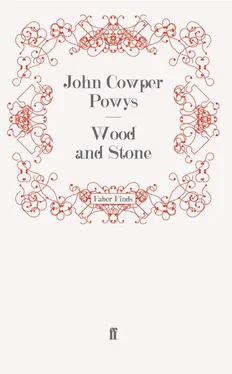The wheel had indeed come full circle for the fair-haired girl. She could not help the thought recurring again and again, as Lacrima’s light fingers adjusted her veil, that the next time she dressed in this manner it would be for her wedding-day. Her one profound consolation lay in the knowledge that her cousin, eyen more deeply than herself, dreaded the approach of that fatal Thursday.
Her hatred for the pale-cheeked Italian re-accumulated every drop of its former venom, as with an air of affectionate gratitude she accepted her assistance.
It is a psychological peculiarity of certain human beings that the more they hate, the more they crave, with a curious perverted instinct, some sort of physical contact with the object of their hatred.
Every touch of Lacrima’s hand increased the intensity of Gladys’ loathing; and yet, so powerful is the instinct to which I refer, she lost no opportunity of accentuating the contact between them, letting their fingers meet again and again, and even their breath, and throwing back her rounded chin to make it easier for those hated wrists to busy themselves about her throat. Her general air was an air of playful passivity; but at one moment, imprinting a kiss on the girl’s arm as, in the process of arranging her veil, it brushed across her cheek, she seemed almost anxious to convey to Lacrima the full implication of her real feeling.
Never has a human caress been so electric with the vibrations of antipathy, as was that kiss. She followed up this signal of animosity by a series of feline taunts relative to John Goring, one of which, from its illuminated insight into the complex strata of the girl’s soul, delighted her by its effect.
Lacrima winced under it, as if under the sting of a lash, and a burning flood of scarlet suffused her cheeks. She dropped her hands and stepped back, uttering a fierce vow that nothing — nothing on earth — would induce her to accompany a girl who could say such things, to such a ceremony!
“No, I wouldn’t, — I wouldn’t!” cried Gladys mockingly. “I wouldn’t dream of coming with me! Tomorrow week, anyway, we’re bound to go to church side by side. Father wanted to drive with me then, you know, and to let mother go with you, — but I wouldn’t hear of it! I said they must go in one carriage, and you and I in another, so that our last drive together we should be quite by ourselves. You’ll like that, won’t you, darling?”
Lacrima’s only answer to this was to turn her back to her cousin, and begin putting on her hat and gloves.
“I know where you’re going,” said Gladys. “You’re going to see your dear Maurice. Give him my love! I should be ashamed to let such a wretched coward come near me.
“James — poor boy! — was a fellow of a different metal. He’d some spirit in him. Listen! When that bell stops tolling they’ll be carrying him into the church. I expect you’re thinking now, darling, that it would have been better” if you’d treated him differently. Of course you know it’s you that killed him? Oh, nobody else! Just little Lacrima and her coy, demure ways!
“ I’ve never killed a man. I can say that, at all events.
“That’s right! Run off to her dear Maurice, — her dear brave Maurice! Perhaps he’ll take her on his knees again, and she’ll play the sweet little innocent, — like that day when I peeped through the window!”
This final dart had hardly reached its objective before Lacrima without attempting any retort rushed from the room.
“I will go and see Maurice. I will! I will!” she murmured to herself as she ran down the broad oak stair-case, and slipped out by the East door.
Simultaneously with these events, a scene of equal dramatic intensity, though of a very different character, was being enacted in the vicarage drawing-room.
Vennie, as we have noted, had resolved to postpone for the present her reception into the Catholic Church. She had also resolved that nothing on earth should induce her to reveal to her mother her change of creed until the thing was an accomplished fact. The worst, however, of the kind of mental suppression in which she had been living of late, is that it tends to produce a volcanic excitement of the nerves, liable at any moment to ungovernable upheavals. Quite little things — mere straws and bagatelles — are enough to set this eruption beginning; and when once it begins, the accumulated passion of the long days of fermentation gives the explosion a horrible force.
One perpetual annoyance to Vennie was her mother’s persistent fondness for family prayers. It seemed to the girl as though Valentia insisted on this performance, not so much out of a desire to serve God, as out of a sense of what was due to herself as the mistress of a well-conducted establishment.
Vennie always fancied she discerned a peculiar tone of self-satisfaction in her mother’s voice, as, rather loudly, and extremely clearly, she read her liturgical selections to the assembled servants.
On this particular morning the girl had avoided the performance of this rite, by leaving her room earlier than usual and taking refuge in the furthest of the vicarage orchards. Backwards and forwards she walked, in that secluded place, with her hands behind her and her head bent, heedless of the drenching dew which covered every grass-blade and of the heavy white mists that still hung about the tree-trunks. She was obliged to return to her room and change her shoes and stockings before joining her mother at breakfast, but not before she had prayed a desperate prayer, down there among the misty trees, for the eternal rest of James Andersen’s soul.
This little incident of her absence from prayers was the direct cause of the unfortunate scene that followed.
Valentia hardly spoke to her daughter while the meal proceeded, and when at last it was over, she retired to the drawing-room and began writing letters.
This was an extremely ill-omened sign to anyone who knew Mrs. Seldom’s habits. Under normal conditions, her first proceeding after breakfast was to move to the kitchen, where she engaged in a long culinary debate with both cook and gardener; a course of action which was extremely essential, as without it, — so bitter was the feud between these two worthies, — it is unlikely that there would have been any vegetables at all, either for lunch or dinner. When anything occurred to throw her into a mood of especially good spirits, she would pass straight out of the French window on to the front lawn, and armed with a pair of formidable garden-scissors would make a selection of flowers and leaves appropriate to a festival temper.
But this adjournment at so early an hour to the task of letter-writing indicated that Valentia was in a condition of mind, which in anyone but a lady of her distinction and breeding could have been called nothing less than a furious rage. For of all things in the world, Mrs. Seldom most detested this business of writing letters; and therefore, — with that perverse self-punishing instinct, which is one of the most artful weapons of offence given to refined gentle-women, — she took grim satisfaction in setting herself down to write; thus producing chaos in the kitchen, where the gardener refused to obey the cook, and miserable remorse in the heart of Vennie, who wandered up and down the lawn meditating a penitential apology.
Satisfied in her heart that she was causing universal annoyance and embarrassment by her proceeding, and yet quite confident that there was nothing but what was proper and natural in her writing letters at nine o’clock in the morning, Valentia began, by gentle degrees, to recover her lost temper.
The only real sedative to thoroughly aggravated nerves, is the infliction of similar aggravation upon the nerves of others. This process is like the laying on of healing ointment; and the more extended the disturbance which we have the good fortune to create, the sooner we ourselves recover our equanimity.
Читать дальше












